Report on Sustainable and Responsible Tourism Management - Unit 32
VerifiedAdded on 2023/01/11
|8
|2037
|87
Report
AI Summary
This report delves into the realm of sustainable and responsible tourism management, examining its evolution and significance within the travel and tourism industry. It begins by defining the concept of sustainable tourism and its evolution, highlighting the importance of balancing the needs of tourists with environmental conservation. The report analyzes the role of leading global organizations like UNWTO in promoting sustainable practices and setting ethical standards. It then explores the purpose and principles of tourism development and planning, emphasizing the mitigation of adverse effects. The report evaluates the processes involved in tourism development and planning, addressing associated challenges. It uses Regent Hotels and Resorts as a case study, examining how sustainable methods can be implemented. The report concludes by emphasizing the importance of adopting sustainable practices to benefit all stakeholders, including the tourism organizations, tourists, and the government, and ensuring the quality of living.
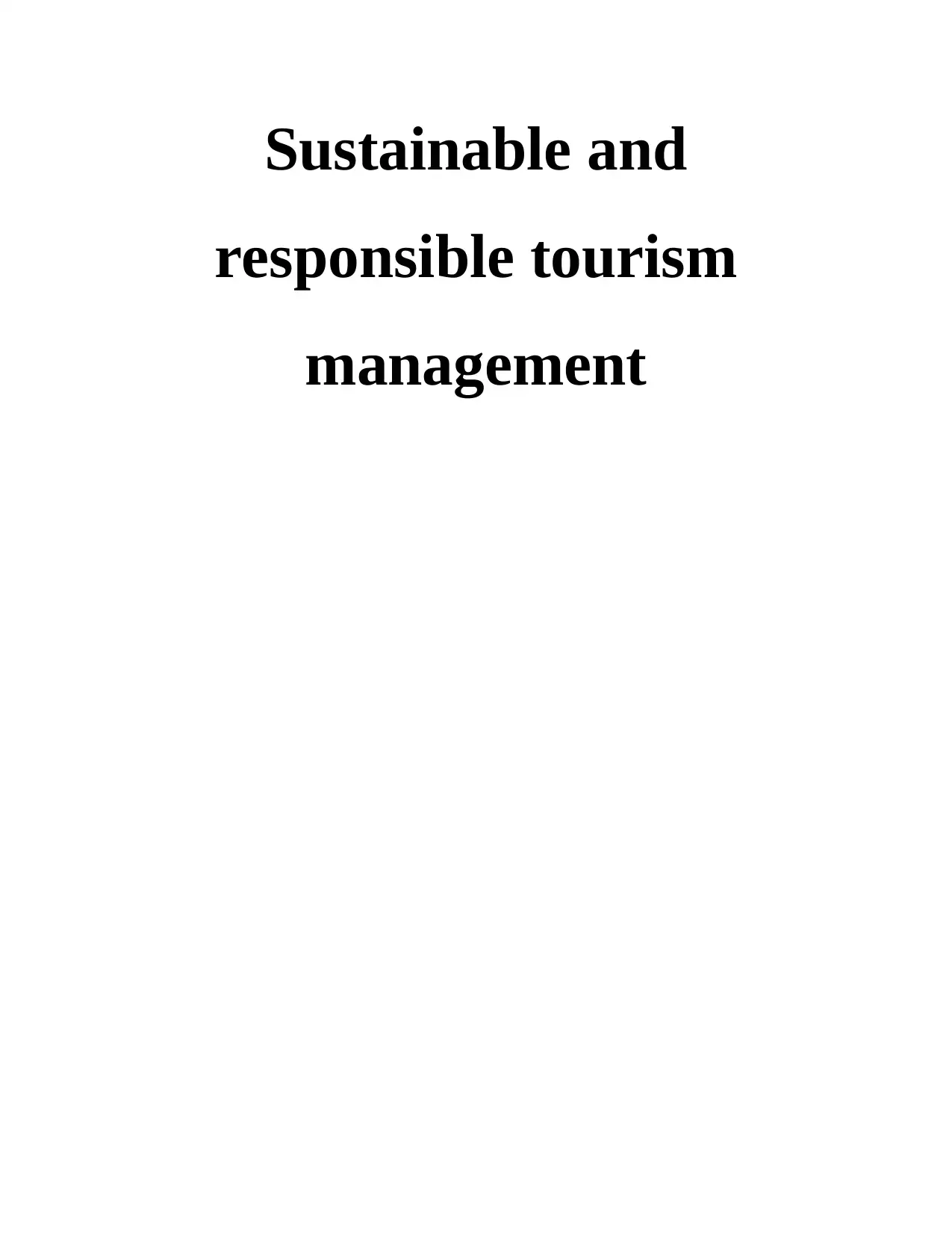
Sustainable and
responsible tourism
management
responsible tourism
management
Paraphrase This Document
Need a fresh take? Get an instant paraphrase of this document with our AI Paraphraser
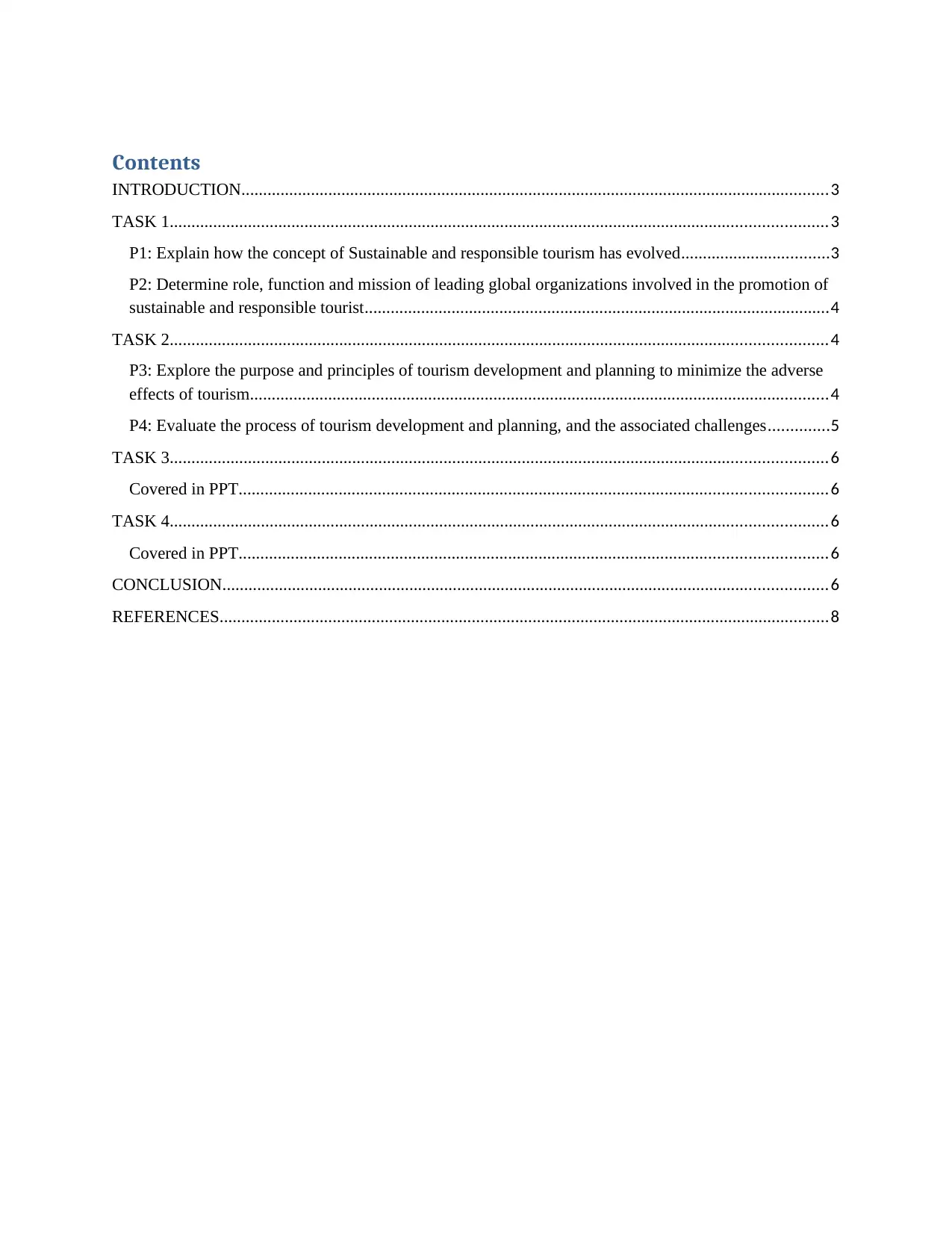
Contents
INTRODUCTION.......................................................................................................................................3
TASK 1.......................................................................................................................................................3
P1: Explain how the concept of Sustainable and responsible tourism has evolved..................................3
P2: Determine role, function and mission of leading global organizations involved in the promotion of
sustainable and responsible tourist...........................................................................................................4
TASK 2.......................................................................................................................................................4
P3: Explore the purpose and principles of tourism development and planning to minimize the adverse
effects of tourism.....................................................................................................................................4
P4: Evaluate the process of tourism development and planning, and the associated challenges..............5
TASK 3.......................................................................................................................................................6
Covered in PPT.......................................................................................................................................6
TASK 4.......................................................................................................................................................6
Covered in PPT.......................................................................................................................................6
CONCLUSION...........................................................................................................................................6
REFERENCES............................................................................................................................................8
INTRODUCTION.......................................................................................................................................3
TASK 1.......................................................................................................................................................3
P1: Explain how the concept of Sustainable and responsible tourism has evolved..................................3
P2: Determine role, function and mission of leading global organizations involved in the promotion of
sustainable and responsible tourist...........................................................................................................4
TASK 2.......................................................................................................................................................4
P3: Explore the purpose and principles of tourism development and planning to minimize the adverse
effects of tourism.....................................................................................................................................4
P4: Evaluate the process of tourism development and planning, and the associated challenges..............5
TASK 3.......................................................................................................................................................6
Covered in PPT.......................................................................................................................................6
TASK 4.......................................................................................................................................................6
Covered in PPT.......................................................................................................................................6
CONCLUSION...........................................................................................................................................6
REFERENCES............................................................................................................................................8
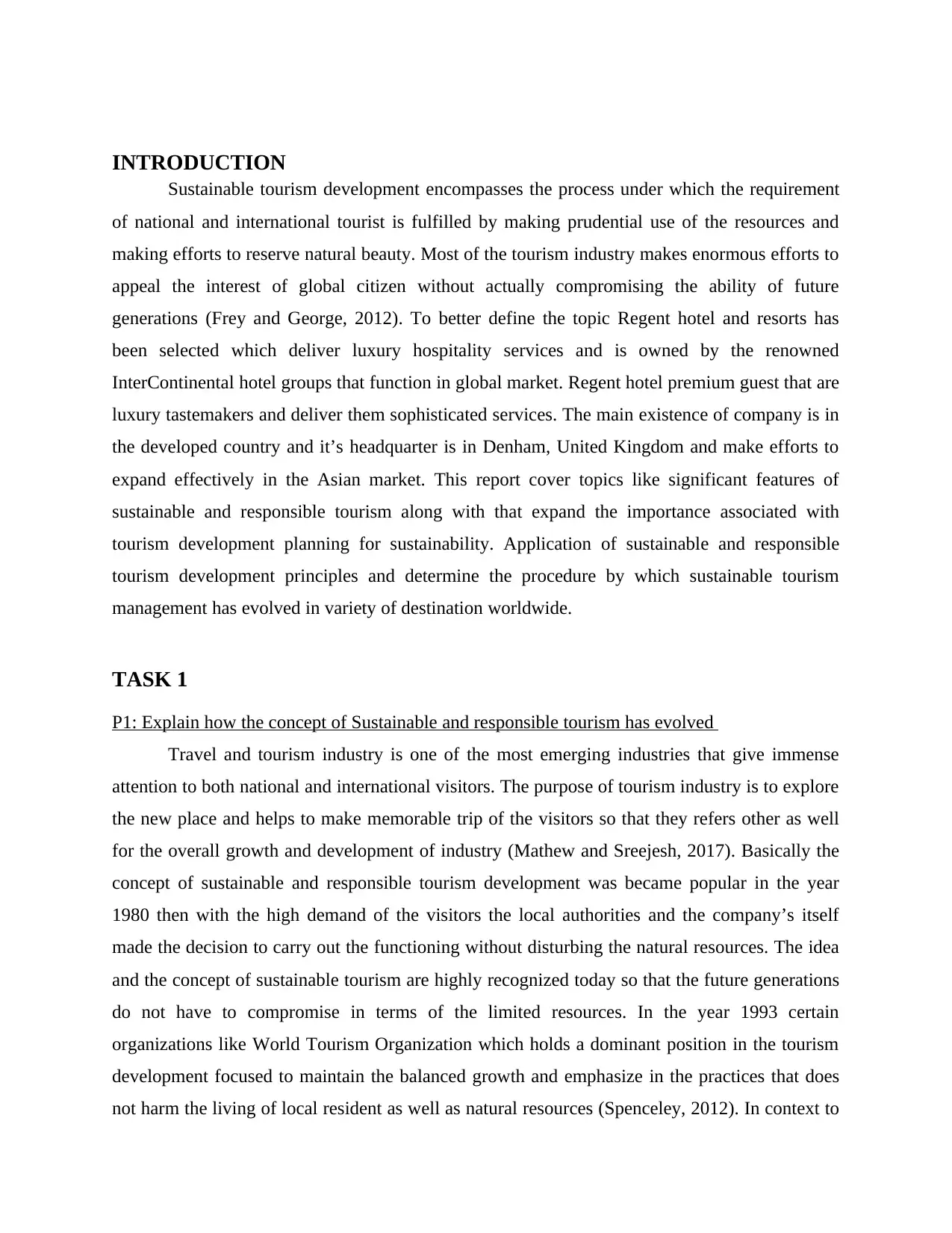
INTRODUCTION
Sustainable tourism development encompasses the process under which the requirement
of national and international tourist is fulfilled by making prudential use of the resources and
making efforts to reserve natural beauty. Most of the tourism industry makes enormous efforts to
appeal the interest of global citizen without actually compromising the ability of future
generations (Frey and George, 2012). To better define the topic Regent hotel and resorts has
been selected which deliver luxury hospitality services and is owned by the renowned
InterContinental hotel groups that function in global market. Regent hotel premium guest that are
luxury tastemakers and deliver them sophisticated services. The main existence of company is in
the developed country and it’s headquarter is in Denham, United Kingdom and make efforts to
expand effectively in the Asian market. This report cover topics like significant features of
sustainable and responsible tourism along with that expand the importance associated with
tourism development planning for sustainability. Application of sustainable and responsible
tourism development principles and determine the procedure by which sustainable tourism
management has evolved in variety of destination worldwide.
TASK 1
P1: Explain how the concept of Sustainable and responsible tourism has evolved
Travel and tourism industry is one of the most emerging industries that give immense
attention to both national and international visitors. The purpose of tourism industry is to explore
the new place and helps to make memorable trip of the visitors so that they refers other as well
for the overall growth and development of industry (Mathew and Sreejesh, 2017). Basically the
concept of sustainable and responsible tourism development was became popular in the year
1980 then with the high demand of the visitors the local authorities and the company’s itself
made the decision to carry out the functioning without disturbing the natural resources. The idea
and the concept of sustainable tourism are highly recognized today so that the future generations
do not have to compromise in terms of the limited resources. In the year 1993 certain
organizations like World Tourism Organization which holds a dominant position in the tourism
development focused to maintain the balanced growth and emphasize in the practices that does
not harm the living of local resident as well as natural resources (Spenceley, 2012). In context to
Sustainable tourism development encompasses the process under which the requirement
of national and international tourist is fulfilled by making prudential use of the resources and
making efforts to reserve natural beauty. Most of the tourism industry makes enormous efforts to
appeal the interest of global citizen without actually compromising the ability of future
generations (Frey and George, 2012). To better define the topic Regent hotel and resorts has
been selected which deliver luxury hospitality services and is owned by the renowned
InterContinental hotel groups that function in global market. Regent hotel premium guest that are
luxury tastemakers and deliver them sophisticated services. The main existence of company is in
the developed country and it’s headquarter is in Denham, United Kingdom and make efforts to
expand effectively in the Asian market. This report cover topics like significant features of
sustainable and responsible tourism along with that expand the importance associated with
tourism development planning for sustainability. Application of sustainable and responsible
tourism development principles and determine the procedure by which sustainable tourism
management has evolved in variety of destination worldwide.
TASK 1
P1: Explain how the concept of Sustainable and responsible tourism has evolved
Travel and tourism industry is one of the most emerging industries that give immense
attention to both national and international visitors. The purpose of tourism industry is to explore
the new place and helps to make memorable trip of the visitors so that they refers other as well
for the overall growth and development of industry (Mathew and Sreejesh, 2017). Basically the
concept of sustainable and responsible tourism development was became popular in the year
1980 then with the high demand of the visitors the local authorities and the company’s itself
made the decision to carry out the functioning without disturbing the natural resources. The idea
and the concept of sustainable tourism are highly recognized today so that the future generations
do not have to compromise in terms of the limited resources. In the year 1993 certain
organizations like World Tourism Organization which holds a dominant position in the tourism
development focused to maintain the balanced growth and emphasize in the practices that does
not harm the living of local resident as well as natural resources (Spenceley, 2012). In context to
⊘ This is a preview!⊘
Do you want full access?
Subscribe today to unlock all pages.

Trusted by 1+ million students worldwide
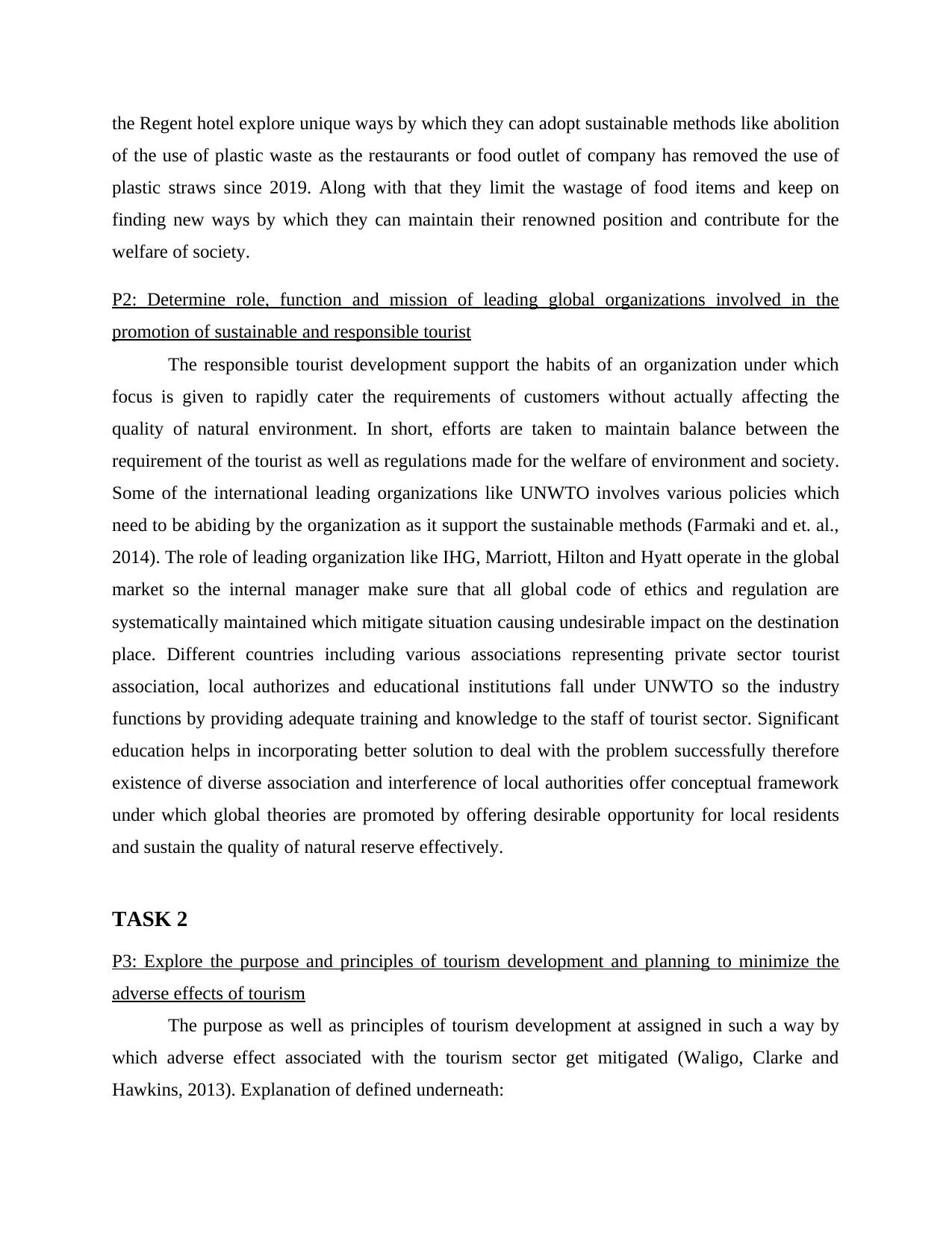
the Regent hotel explore unique ways by which they can adopt sustainable methods like abolition
of the use of plastic waste as the restaurants or food outlet of company has removed the use of
plastic straws since 2019. Along with that they limit the wastage of food items and keep on
finding new ways by which they can maintain their renowned position and contribute for the
welfare of society.
P2: Determine role, function and mission of leading global organizations involved in the
promotion of sustainable and responsible tourist
The responsible tourist development support the habits of an organization under which
focus is given to rapidly cater the requirements of customers without actually affecting the
quality of natural environment. In short, efforts are taken to maintain balance between the
requirement of the tourist as well as regulations made for the welfare of environment and society.
Some of the international leading organizations like UNWTO involves various policies which
need to be abiding by the organization as it support the sustainable methods (Farmaki and et. al.,
2014). The role of leading organization like IHG, Marriott, Hilton and Hyatt operate in the global
market so the internal manager make sure that all global code of ethics and regulation are
systematically maintained which mitigate situation causing undesirable impact on the destination
place. Different countries including various associations representing private sector tourist
association, local authorizes and educational institutions fall under UNWTO so the industry
functions by providing adequate training and knowledge to the staff of tourist sector. Significant
education helps in incorporating better solution to deal with the problem successfully therefore
existence of diverse association and interference of local authorities offer conceptual framework
under which global theories are promoted by offering desirable opportunity for local residents
and sustain the quality of natural reserve effectively.
TASK 2
P3: Explore the purpose and principles of tourism development and planning to minimize the
adverse effects of tourism
The purpose as well as principles of tourism development at assigned in such a way by
which adverse effect associated with the tourism sector get mitigated (Waligo, Clarke and
Hawkins, 2013). Explanation of defined underneath:
of the use of plastic waste as the restaurants or food outlet of company has removed the use of
plastic straws since 2019. Along with that they limit the wastage of food items and keep on
finding new ways by which they can maintain their renowned position and contribute for the
welfare of society.
P2: Determine role, function and mission of leading global organizations involved in the
promotion of sustainable and responsible tourist
The responsible tourist development support the habits of an organization under which
focus is given to rapidly cater the requirements of customers without actually affecting the
quality of natural environment. In short, efforts are taken to maintain balance between the
requirement of the tourist as well as regulations made for the welfare of environment and society.
Some of the international leading organizations like UNWTO involves various policies which
need to be abiding by the organization as it support the sustainable methods (Farmaki and et. al.,
2014). The role of leading organization like IHG, Marriott, Hilton and Hyatt operate in the global
market so the internal manager make sure that all global code of ethics and regulation are
systematically maintained which mitigate situation causing undesirable impact on the destination
place. Different countries including various associations representing private sector tourist
association, local authorizes and educational institutions fall under UNWTO so the industry
functions by providing adequate training and knowledge to the staff of tourist sector. Significant
education helps in incorporating better solution to deal with the problem successfully therefore
existence of diverse association and interference of local authorities offer conceptual framework
under which global theories are promoted by offering desirable opportunity for local residents
and sustain the quality of natural reserve effectively.
TASK 2
P3: Explore the purpose and principles of tourism development and planning to minimize the
adverse effects of tourism
The purpose as well as principles of tourism development at assigned in such a way by
which adverse effect associated with the tourism sector get mitigated (Waligo, Clarke and
Hawkins, 2013). Explanation of defined underneath:
Paraphrase This Document
Need a fresh take? Get an instant paraphrase of this document with our AI Paraphraser
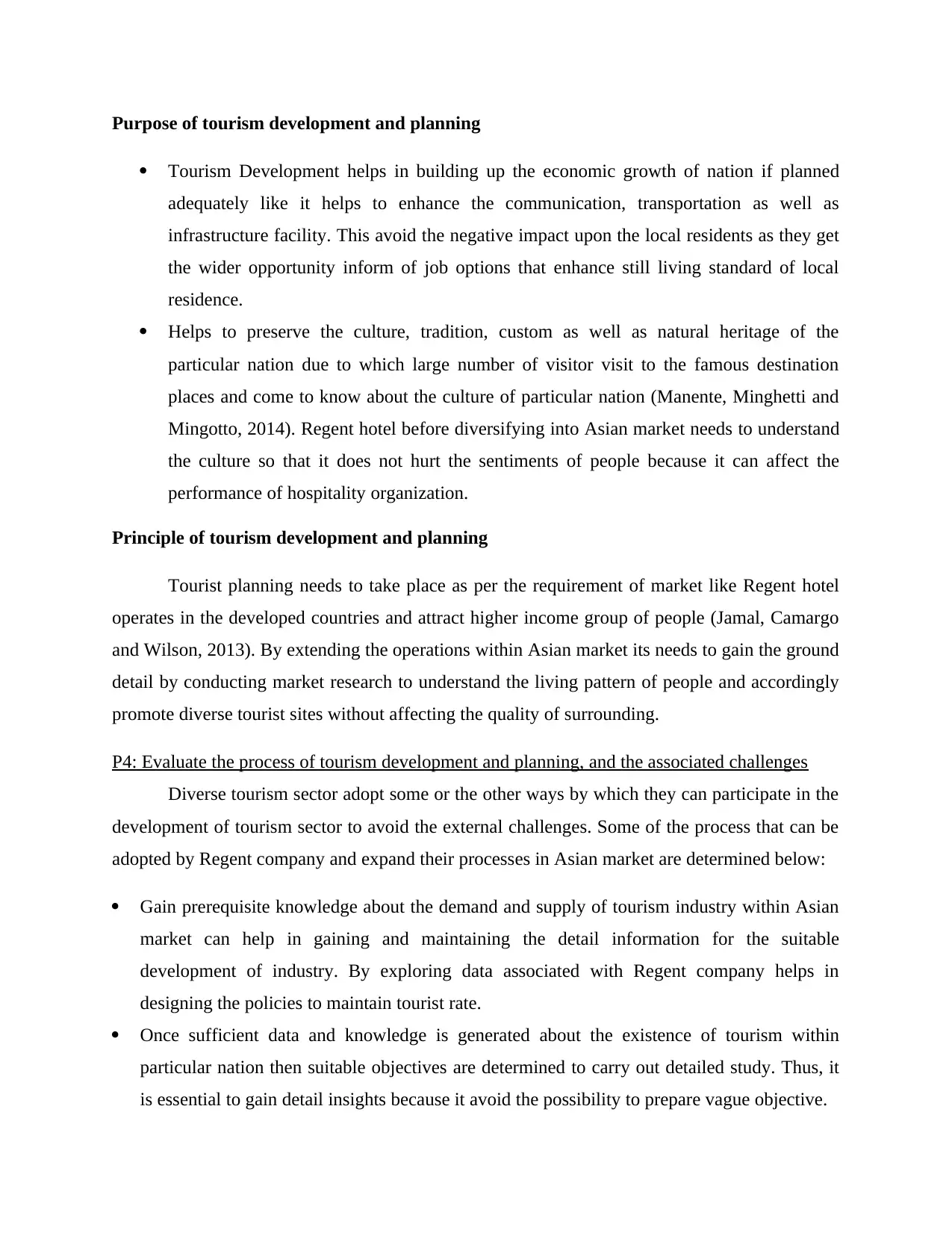
Purpose of tourism development and planning
Tourism Development helps in building up the economic growth of nation if planned
adequately like it helps to enhance the communication, transportation as well as
infrastructure facility. This avoid the negative impact upon the local residents as they get
the wider opportunity inform of job options that enhance still living standard of local
residence.
Helps to preserve the culture, tradition, custom as well as natural heritage of the
particular nation due to which large number of visitor visit to the famous destination
places and come to know about the culture of particular nation (Manente, Minghetti and
Mingotto, 2014). Regent hotel before diversifying into Asian market needs to understand
the culture so that it does not hurt the sentiments of people because it can affect the
performance of hospitality organization.
Principle of tourism development and planning
Tourist planning needs to take place as per the requirement of market like Regent hotel
operates in the developed countries and attract higher income group of people (Jamal, Camargo
and Wilson, 2013). By extending the operations within Asian market its needs to gain the ground
detail by conducting market research to understand the living pattern of people and accordingly
promote diverse tourist sites without affecting the quality of surrounding.
P4: Evaluate the process of tourism development and planning, and the associated challenges
Diverse tourism sector adopt some or the other ways by which they can participate in the
development of tourism sector to avoid the external challenges. Some of the process that can be
adopted by Regent company and expand their processes in Asian market are determined below:
Gain prerequisite knowledge about the demand and supply of tourism industry within Asian
market can help in gaining and maintaining the detail information for the suitable
development of industry. By exploring data associated with Regent company helps in
designing the policies to maintain tourist rate.
Once sufficient data and knowledge is generated about the existence of tourism within
particular nation then suitable objectives are determined to carry out detailed study. Thus, it
is essential to gain detail insights because it avoid the possibility to prepare vague objective.
Tourism Development helps in building up the economic growth of nation if planned
adequately like it helps to enhance the communication, transportation as well as
infrastructure facility. This avoid the negative impact upon the local residents as they get
the wider opportunity inform of job options that enhance still living standard of local
residence.
Helps to preserve the culture, tradition, custom as well as natural heritage of the
particular nation due to which large number of visitor visit to the famous destination
places and come to know about the culture of particular nation (Manente, Minghetti and
Mingotto, 2014). Regent hotel before diversifying into Asian market needs to understand
the culture so that it does not hurt the sentiments of people because it can affect the
performance of hospitality organization.
Principle of tourism development and planning
Tourist planning needs to take place as per the requirement of market like Regent hotel
operates in the developed countries and attract higher income group of people (Jamal, Camargo
and Wilson, 2013). By extending the operations within Asian market its needs to gain the ground
detail by conducting market research to understand the living pattern of people and accordingly
promote diverse tourist sites without affecting the quality of surrounding.
P4: Evaluate the process of tourism development and planning, and the associated challenges
Diverse tourism sector adopt some or the other ways by which they can participate in the
development of tourism sector to avoid the external challenges. Some of the process that can be
adopted by Regent company and expand their processes in Asian market are determined below:
Gain prerequisite knowledge about the demand and supply of tourism industry within Asian
market can help in gaining and maintaining the detail information for the suitable
development of industry. By exploring data associated with Regent company helps in
designing the policies to maintain tourist rate.
Once sufficient data and knowledge is generated about the existence of tourism within
particular nation then suitable objectives are determined to carry out detailed study. Thus, it
is essential to gain detail insights because it avoid the possibility to prepare vague objective.
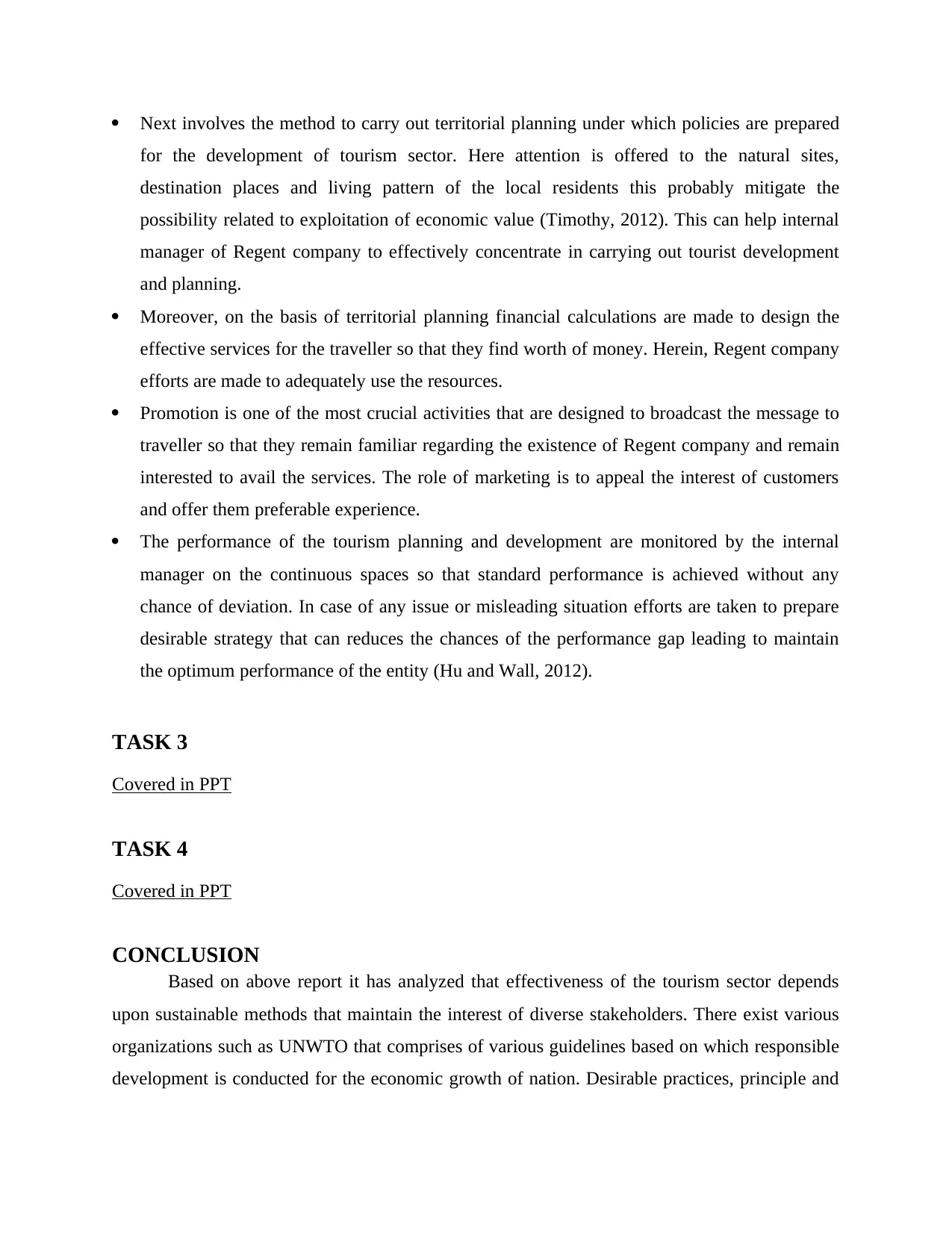
Next involves the method to carry out territorial planning under which policies are prepared
for the development of tourism sector. Here attention is offered to the natural sites,
destination places and living pattern of the local residents this probably mitigate the
possibility related to exploitation of economic value (Timothy, 2012). This can help internal
manager of Regent company to effectively concentrate in carrying out tourist development
and planning.
Moreover, on the basis of territorial planning financial calculations are made to design the
effective services for the traveller so that they find worth of money. Herein, Regent company
efforts are made to adequately use the resources.
Promotion is one of the most crucial activities that are designed to broadcast the message to
traveller so that they remain familiar regarding the existence of Regent company and remain
interested to avail the services. The role of marketing is to appeal the interest of customers
and offer them preferable experience.
The performance of the tourism planning and development are monitored by the internal
manager on the continuous spaces so that standard performance is achieved without any
chance of deviation. In case of any issue or misleading situation efforts are taken to prepare
desirable strategy that can reduces the chances of the performance gap leading to maintain
the optimum performance of the entity (Hu and Wall, 2012).
TASK 3
Covered in PPT
TASK 4
Covered in PPT
CONCLUSION
Based on above report it has analyzed that effectiveness of the tourism sector depends
upon sustainable methods that maintain the interest of diverse stakeholders. There exist various
organizations such as UNWTO that comprises of various guidelines based on which responsible
development is conducted for the economic growth of nation. Desirable practices, principle and
for the development of tourism sector. Here attention is offered to the natural sites,
destination places and living pattern of the local residents this probably mitigate the
possibility related to exploitation of economic value (Timothy, 2012). This can help internal
manager of Regent company to effectively concentrate in carrying out tourist development
and planning.
Moreover, on the basis of territorial planning financial calculations are made to design the
effective services for the traveller so that they find worth of money. Herein, Regent company
efforts are made to adequately use the resources.
Promotion is one of the most crucial activities that are designed to broadcast the message to
traveller so that they remain familiar regarding the existence of Regent company and remain
interested to avail the services. The role of marketing is to appeal the interest of customers
and offer them preferable experience.
The performance of the tourism planning and development are monitored by the internal
manager on the continuous spaces so that standard performance is achieved without any
chance of deviation. In case of any issue or misleading situation efforts are taken to prepare
desirable strategy that can reduces the chances of the performance gap leading to maintain
the optimum performance of the entity (Hu and Wall, 2012).
TASK 3
Covered in PPT
TASK 4
Covered in PPT
CONCLUSION
Based on above report it has analyzed that effectiveness of the tourism sector depends
upon sustainable methods that maintain the interest of diverse stakeholders. There exist various
organizations such as UNWTO that comprises of various guidelines based on which responsible
development is conducted for the economic growth of nation. Desirable practices, principle and
⊘ This is a preview!⊘
Do you want full access?
Subscribe today to unlock all pages.

Trusted by 1+ million students worldwide
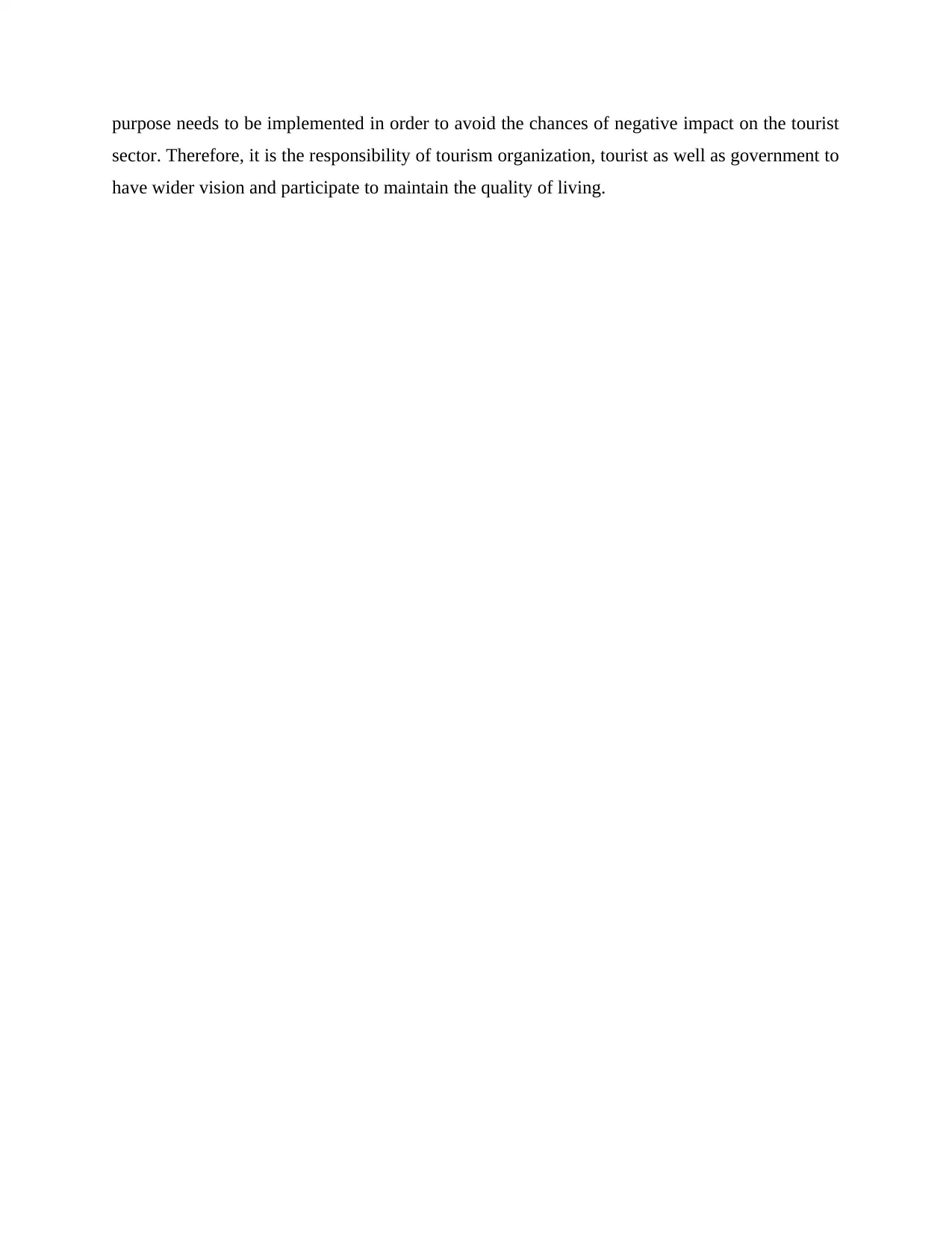
purpose needs to be implemented in order to avoid the chances of negative impact on the tourist
sector. Therefore, it is the responsibility of tourism organization, tourist as well as government to
have wider vision and participate to maintain the quality of living.
sector. Therefore, it is the responsibility of tourism organization, tourist as well as government to
have wider vision and participate to maintain the quality of living.
Paraphrase This Document
Need a fresh take? Get an instant paraphrase of this document with our AI Paraphraser
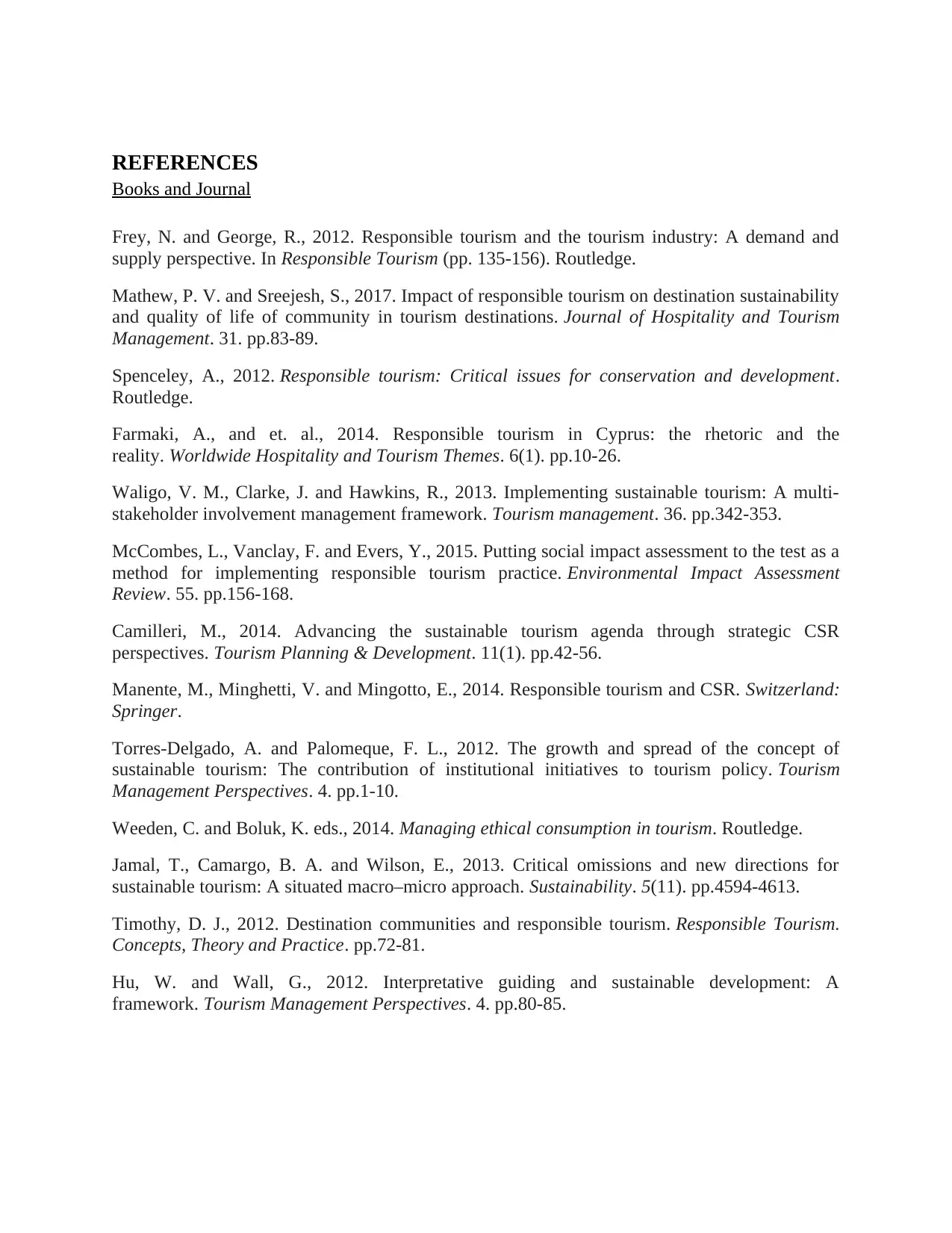
REFERENCES
Books and Journal
Frey, N. and George, R., 2012. Responsible tourism and the tourism industry: A demand and
supply perspective. In Responsible Tourism (pp. 135-156). Routledge.
Mathew, P. V. and Sreejesh, S., 2017. Impact of responsible tourism on destination sustainability
and quality of life of community in tourism destinations. Journal of Hospitality and Tourism
Management. 31. pp.83-89.
Spenceley, A., 2012. Responsible tourism: Critical issues for conservation and development.
Routledge.
Farmaki, A., and et. al., 2014. Responsible tourism in Cyprus: the rhetoric and the
reality. Worldwide Hospitality and Tourism Themes. 6(1). pp.10-26.
Waligo, V. M., Clarke, J. and Hawkins, R., 2013. Implementing sustainable tourism: A multi-
stakeholder involvement management framework. Tourism management. 36. pp.342-353.
McCombes, L., Vanclay, F. and Evers, Y., 2015. Putting social impact assessment to the test as a
method for implementing responsible tourism practice. Environmental Impact Assessment
Review. 55. pp.156-168.
Camilleri, M., 2014. Advancing the sustainable tourism agenda through strategic CSR
perspectives. Tourism Planning & Development. 11(1). pp.42-56.
Manente, M., Minghetti, V. and Mingotto, E., 2014. Responsible tourism and CSR. Switzerland:
Springer.
Torres-Delgado, A. and Palomeque, F. L., 2012. The growth and spread of the concept of
sustainable tourism: The contribution of institutional initiatives to tourism policy. Tourism
Management Perspectives. 4. pp.1-10.
Weeden, C. and Boluk, K. eds., 2014. Managing ethical consumption in tourism. Routledge.
Jamal, T., Camargo, B. A. and Wilson, E., 2013. Critical omissions and new directions for
sustainable tourism: A situated macro–micro approach. Sustainability. 5(11). pp.4594-4613.
Timothy, D. J., 2012. Destination communities and responsible tourism. Responsible Tourism.
Concepts, Theory and Practice. pp.72-81.
Hu, W. and Wall, G., 2012. Interpretative guiding and sustainable development: A
framework. Tourism Management Perspectives. 4. pp.80-85.
Books and Journal
Frey, N. and George, R., 2012. Responsible tourism and the tourism industry: A demand and
supply perspective. In Responsible Tourism (pp. 135-156). Routledge.
Mathew, P. V. and Sreejesh, S., 2017. Impact of responsible tourism on destination sustainability
and quality of life of community in tourism destinations. Journal of Hospitality and Tourism
Management. 31. pp.83-89.
Spenceley, A., 2012. Responsible tourism: Critical issues for conservation and development.
Routledge.
Farmaki, A., and et. al., 2014. Responsible tourism in Cyprus: the rhetoric and the
reality. Worldwide Hospitality and Tourism Themes. 6(1). pp.10-26.
Waligo, V. M., Clarke, J. and Hawkins, R., 2013. Implementing sustainable tourism: A multi-
stakeholder involvement management framework. Tourism management. 36. pp.342-353.
McCombes, L., Vanclay, F. and Evers, Y., 2015. Putting social impact assessment to the test as a
method for implementing responsible tourism practice. Environmental Impact Assessment
Review. 55. pp.156-168.
Camilleri, M., 2014. Advancing the sustainable tourism agenda through strategic CSR
perspectives. Tourism Planning & Development. 11(1). pp.42-56.
Manente, M., Minghetti, V. and Mingotto, E., 2014. Responsible tourism and CSR. Switzerland:
Springer.
Torres-Delgado, A. and Palomeque, F. L., 2012. The growth and spread of the concept of
sustainable tourism: The contribution of institutional initiatives to tourism policy. Tourism
Management Perspectives. 4. pp.1-10.
Weeden, C. and Boluk, K. eds., 2014. Managing ethical consumption in tourism. Routledge.
Jamal, T., Camargo, B. A. and Wilson, E., 2013. Critical omissions and new directions for
sustainable tourism: A situated macro–micro approach. Sustainability. 5(11). pp.4594-4613.
Timothy, D. J., 2012. Destination communities and responsible tourism. Responsible Tourism.
Concepts, Theory and Practice. pp.72-81.
Hu, W. and Wall, G., 2012. Interpretative guiding and sustainable development: A
framework. Tourism Management Perspectives. 4. pp.80-85.
1 out of 8
Related Documents
Your All-in-One AI-Powered Toolkit for Academic Success.
+13062052269
info@desklib.com
Available 24*7 on WhatsApp / Email
![[object Object]](/_next/static/media/star-bottom.7253800d.svg)
Unlock your academic potential
Copyright © 2020–2025 A2Z Services. All Rights Reserved. Developed and managed by ZUCOL.





